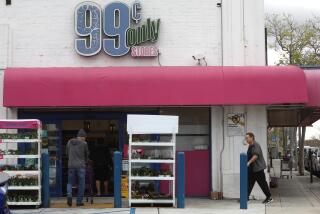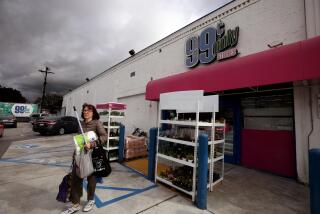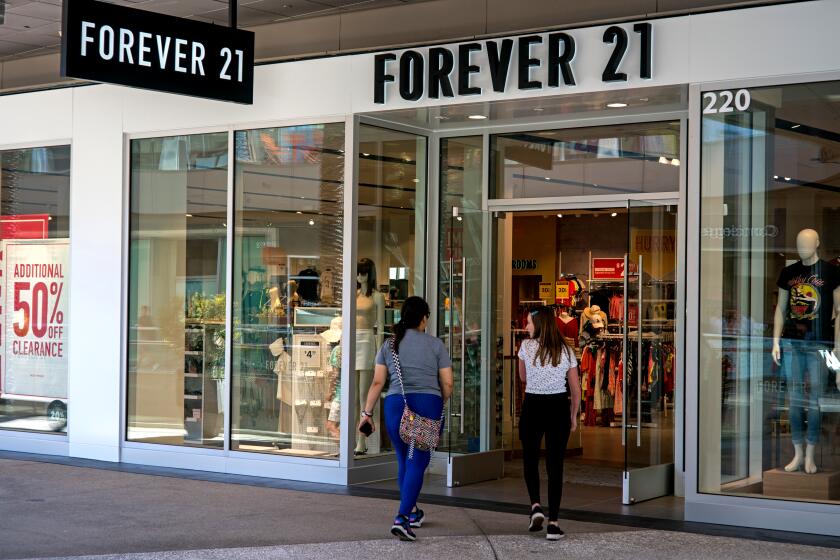Penney Buy Puts Little Beeba’s in the Big Time : But S.D. Clothier Is Expected to Give Huge Chain a Boost
- Share via
By any standard of measurement, Beeba’s Creations Inc. shrinks in comparison with retail giant J.C. Penney Co. Inc., which last week paid $19.2 million for a 20% interest in Beeba’s stock. Penney’s 1986 revenues of $14.7 billion make Beeba’s 1986 sales of $93 million seem insignificant.
But numbers don’t always tell the entire story. Several securities analysts say Beeba’s, a Miramar Road-based clothing supplier, could play a prominent role in Penney’s strategy of entering the specialty retail clothing business over the next decade.
The stock buy calls for Beeba’s to be a key supplier for a new junior women’s wear chain that Penney will start up next year, a relationship that could be worth $25 million in additional sales for Beeba’s by 1989. Penney’s also sees Beeba’s as its “window” onto the growing and increasingly complex world of foreign clothing supply sourcing that is so critical to success in specialty retailing.
Sought Specialty Line
Like its retail brethren Sears Roebuck & Co. and K mart Corp., Penney for years has planned to branch off into specialty retailing, which, as one analyst defined it, involves any merchandising that is more tightly focused than the general merchandising Penney practices at its mall stores.
Penney’s motives for branching out are based, not surprisingly, on demographics and economics. The slowdown in growth of giant regional suburban shopping malls in recent years has reduced Penney’s opportunities for sales growth through more store openings. At the same time, increasing numbers of younger consumers, particularly women, seem to be turning away from department stores and toward specialty shops for their clothing needs.
“Chains like Sears and Penney can improve their profitability, but cannot gain market share” through their shopping-mall stores, said Monroe Greenstein, a senior retail analyst with Bear Stearns & Co. of New York. “You need a vehicle like specialty retailing to give above-average growth.”
Starting early next year, Penney will begin opening 2,000-square-foot junior women’s clothing stores, all located within 100 existing Penney department stores. Terms of Penney’s purchase of Beeba’s stock call for Beeba’s to supply 50% to 60% of the clothing for this new chain. Penney will also get one seat on Beeba’s board of directors, a Penney spokesman said.
Penney and Beeba’s say chances are that the Penney will expand the chain outside the department store walls as a stand-alone chain in the future, depending on the success of the venture.
Penney “is moving into an area of strength for them,” Greenstein said.
Beeba’s role in the new operation will be to do what it has done for the last 14 years, to be a “knock-off shop” that takes fashions off the rack in “fashion centers” such as London, Paris and New York and has them copied by foreign manufacturers to take advantage of low labor costs. Often, contract clothing manufacturers such as Beeba’s have clothes made to order for large retail clients.
Success for a knock-off shop such as Beeba’s depends on its ability to maneuver its way through a bewildering maze of customs and import laws, to insure quality so as not to burn client bridges with bad merchandise, and to deliver merchandise with a quick turnaround.
In-House Manufacturing
In Beeba’s, Penney is said to see some of the same advantages that The Limited Inc., perhaps the nation’s most successful specialty clothing retailer, saw before acquiring Mast Industries in the late 1970s. Also a contract clothing manufacturer, Mast supplied 25% to 50% of The Limited’s $3.1 billion in sales last year. The Limited owns the Express, Victoria’s Secret and other women’s clothing stores.
“It’s fair to say that a purpose of this deal is to bring contract manufacturing capability in-house,” Penney spokesman Duncan Muir said of the Beeba’s stock purchase.
The agreement will make Penney an even larger customer of Beeba’s than it already is. Penney accounted for 10% of Beeba’s sales last year, second only to The Limited, which bought 21% of Beeba’s products last year.
Beeba’s plans to use the capital in part to finance an ambitious set of manufacturing plants that will change it from mere middleman to foreign exporter, Vice President Thomas Baumann said. Beeba’s recently completed the first phase of a manufacturing plant in Jamaica in which it owns a 25% interest and is considering joining partnerships that would build similar plants in Costa Rica and Peru.
Beeba’s stock has been selling in the $14 to $16 per share range, below the $18.125 price at the company’s secondary stock issue last May. Barry Sahgal, a stock analyst with Ladenburg, Thalmann & Co of New York, said investors may fear that “protectionist talk in Washington, D.C.” could harm all foreign importers, including Beeba’s.
More to Read
Inside the business of entertainment
The Wide Shot brings you news, analysis and insights on everything from streaming wars to production — and what it all means for the future.
You may occasionally receive promotional content from the Los Angeles Times.










